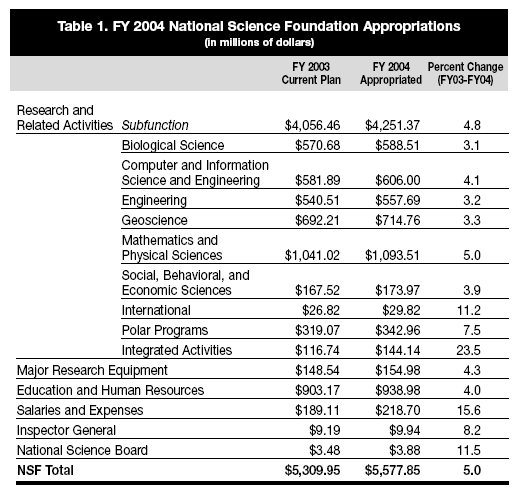THIS IS AN ARCHIVED VERSION OF CRA'S WEBSITE. THIS ARCHIVE IS AVAILABLE TO PROVIDE HISTORICAL CONTENT.
PLEASE VISIT HTTP://WWW.CRA.ORG FOR THE LATEST INFORMATION
| About CRA |
| Membership |
| CRA for Students |
| CRA for Faculty |
| CRA-Women |
| Computing Community Consortium (CCC) |
| Awards |
| Projects |
| Events |
| Jobs |
| Government Affairs |
| Computing Research Policy Blog |
| Publications |
| Data & Resources |
| CRA Bulletin |
| What's New |
| Contact |
| Home |
<< Back to January 2004 CRN Table of Contents
[Published originally in the January 2004 edition of Computing Research News, Vol. 16/No. 1, pp. 1, 5.]
House Approves Modest Increases for IT R&D, NSF in FY 2004; Senate Still to Act
By Peter Harsha
The House wrapped up its FY 2004 appropriations process after returning from the Thanksgiving recess by approving a modest increase in funding for information technology research and development and the National Science Foundation, as part of a gargantuan 700-plus-page omnibus appropriations bill for FY 2004.
Under the agreement, NSF’s budget would grow to $5.57 billion in FY 2004, an increase of $268 million (5 percent) over FY 2003. The appropriation, the largest NSF budget in history, would still fall well short of the 15 percent increase approved by Congress and the President last year in the NSF authorization bill, a rate of increase that would double the agency’s budget in five years.
Also slated for an increase is NSF’s Computer and Information Science and Engineering (CISE) directorate, which would grow to $606 million for FY 2004, an increase of $24 million over FY 2003, or just over 4 percent. The increase includes $225 million for NSF’s Information Technology Research program (ITR) and “not less than $20 million” for the agency’s cyberinfrastructure initiatives in FY 2004.
The omnibus legislation (HR 2673)—a combination of seven of the thirteen appropriations bills Congress is required to pass annually to fund all activities of the federal government—passed the House well after the official start of the 2004 fiscal year, which began October 1, 2003. Lack of agreement with the Bush Administration over a final overall spending number had hindered progress on the seven outstanding bills. Unwilling to prolong the congressional session any longer, Congressional leaders agreed to package the seven outstanding bills— Agriculture, Commerce/State/Justice, District of Columbia, Foreign Operations, Labor/HHS/Education, Transportation/Treasury, and VA/HUD/Independent Agencies (which includes NSF)—into one omnibus bill and make a 0.59 percent cut in every program across the board to make the Administration’s spending target. At press time, the Senate still had not passed the bill.
Overall, IT R&D spending will likely increase in FY 2004. In September, Congress approved increases to IT R&D spending in the Department of Defense (DOD), the Defense Advanced Research Projects Agency, and the new Department of Homeland Security. While the defense-related share of basic research will increase only slightly—to $1.418 billion in FY 2004 from $1.416 billion in FY 2003—overall science and technology spending at DOD will rise to $12.2 billion in FY 04, up from $10.4 billion in FY 03.
Before adjourning, Congress also passed authorization for a federal initiative in nanotechnology research and development. The bill, S.189, authorizes $3.7 billion in R&D funding over the next four years for the National Nanotechnology Initiative, a coordinated, multi-agency research program modeled after the highly successful National Information Technology Research and Development (NITRD) initiative. As with NITRD, the NSF will take the lead role in running the initiative. The program is likely to have a significant information technology research component, something the Computing Research Association noted in supporting the bill when it was introduced.
(For updates on government affairs issues, see the CRA Government Affairs web page at: http://archive.cra.org/govaffairs)

Copyright © 2007 Computing Research Association. All Rights Reserved. Questions? E-mail: webmaster@cra.org.
